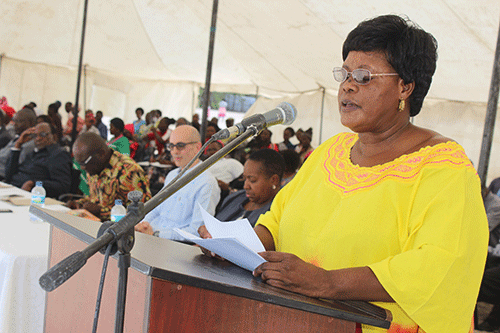A campaign dubbed ‘Leaving No One Behind’ is starting its tour across the country to address sexual and gender-based violence by safeguarding persons with disabilities, pregnant and lactating women, and other vulnerable groups.
Spearheaded by media personality Pombili Shilongo, the GBV prevention and response campaign will return in full swing with regional interventions and community engagements planned for July through to September 2022.
“SGBV continues to be a persistent challenge in Namibia, with incidences of violence among partners, sexual violence and femicide against women and girls on the rise,” said Shilongo.
This time around, the campaign will target 12 schools in the Khomas, Kunene, Ohangwena and Omusati regions, with a primary focus on adolescent girls, and women. As part of the campaign, Shilongo and the regional team will also educate expecting mothers housed in maternity wards as part of the community outreach in each region.
She added the Covid-19 pandemic has provided another layer in the fight against SGBV, as the 2020 UN Policy Brief on the Impact of Covid-19 on Women, Children and Other Minorities revealed.
Shilongo added: “SGBV affects all of us just the same as the Covid-19 pandemic does. It is a fight that we all have to take on together to eradicate for good. I will continue to use my social status and influence for this specific cause and remain a voice for the voiceless.”
“We would like to ensure life-saving GBV assistance to Namibian adolescents, women and men in regions affected by existing inequalities and worsen by the Covid-19 pandemic. This is a region-targeted project aimed at creating awareness on GBV and related social ills for prevention and uptake of available response services,” explained the passionate activist.
Launched in 2020, the campaign is carried out in partnership with the United Nations Population Fund (UNFPA), the Namibia Planned Parenthood Association (NAPPA) with the financial support of the Government of the Republic of Japan and Regain Trust.
Programme coordinator at Regain Trust, Wendy Hauschfieldt said their role in this project is to offer psychosocial and technical support to ultimately enhance survivors of GBV. Regain Trust is a registered non-profit trust that implements activities to promote gender equality, empower women and girls and address key development challenges such as GBV and Sexual and Reproductive Health Issues. “These groups of people selected are considered marginalised. They are left behind and it is sometimes difficult to target them with some of these interventions. Society needs to create an enabling environment for the girl child and all those marginalised,” she told yesterday.
Hauschfieldt referenced that a fully abled person who gets traumatised from an ordeal can express themselves more, not that they are more affected than others but expressive-wise, they are advantaged compared to those with disabilities for instance and that needs to change. -psiririka@nepc.com.na


